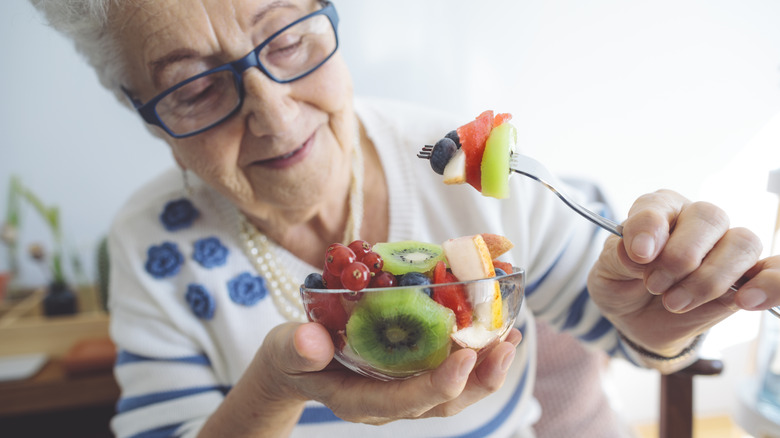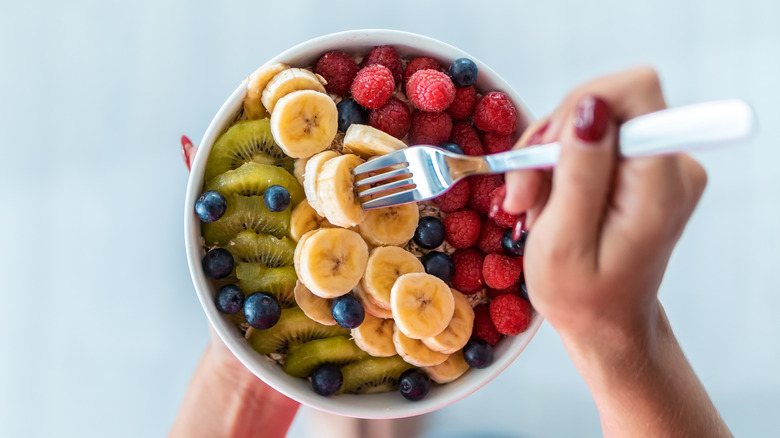Here's What Happens To Your Poop When You Eat Fruit Every Day
If you've ever gone keto or low-carb, fruit was probably off limits so you can reach fat-burning ketosis. After all, most fruits have carbs from sugar — two no-nos when you're on the ketogenic diet. As a result, you could resort to eating a ton of protein and unhealthy fats from processed food (per Harvard Medical School).
Even if you're not on a keto diet, according to the Centers for Disease Control and Prevention, just 12% of people in the U.S. get the recommended 1.5 to 2 cups of fruit per day. Missing out on your daily fruits and vegetables means you're missing out on the health benefits, such as lowering your risk of cardiovascular disease, type 2 diabetes, cancer, and obesity. If you love your high-fat meat, dairy, and processed food and skip on fiber-rich vegetables and fruit, you could also see something else lacking in your life: a daily poop. Yes, giving up fruit could mean constipation (per the National Institute on Aging). Eating fruit every day will help you get things moving down there. However, you'll have to be careful about how much and what kinds of fruit you eat, particularly if you haven't been eating fruit for a while.
Choose fruit low in fructose and high in fiber
If processed or fast food has been the bulk of your diet for a while, suddenly incorporating a ton of fruit into your diet might have you running to the bathroom more often. Fructose, the sugar found in fruit, can sometimes work as a laxative for your body because it stimulates your gut. Fructose could give you diarrhea if you take in more than 40 grams of it per day (per Harvard Medical School). Fruits higher in fructose are jackfruit, apples, grapes, raisins, and pears, according to MyFoodData. An apple has about 12 grams of fructose. Some fruits that are particularly low in fructose are avocados, apricots, raspberries, peaches, and blackberries. A cup of blackberries has 3.5 grams of fructose.
Eating fruit every day will give you a good enough amount of fiber to make it easier to poop. The soluble fiber in fruit dissolves in water to add bulk to your stool and ease diarrhea. The Institute of Medicine recommends 38 grams of fiber a day for men and 25 for women under 50 (via the Mayo Clinic). Fruits highest in fiber are passion fruit, avocado, raspberries, blackberries, and wild blueberries. A cup of raspberries provides 8 grams of fiber. You'll want to avoid fruit juices because they have more fructose without the fiber.
Choose whole fruit
To get the most benefit from fruits for your poop and gut health, Yale Medicine says it's best to eat your fruits whole rather than blended in a smoothie. If you blend your fruits, they pass through your digestive system more easily, causing a spike in your blood sugar. Your brain will also get a dopamine hit, which will entice you to eat more. You'll also want to steer clear of fruit products that have preservatives and sweeteners that can impact your health.
You've probably seen commercials and social media ads for powdered greens. These fruit and vegetable supplements can give you essential vitamins, minerals, antioxidants, and digestive enzymes, but they won't provide the fiber you need in the whole fruit (per Today). While it's easier to toss a greens powder into your smoothie than to keep fresh, whole fruit available in your kitchen, frozen fruit is more convenient and packs the same nutrients as fresh fruit.



